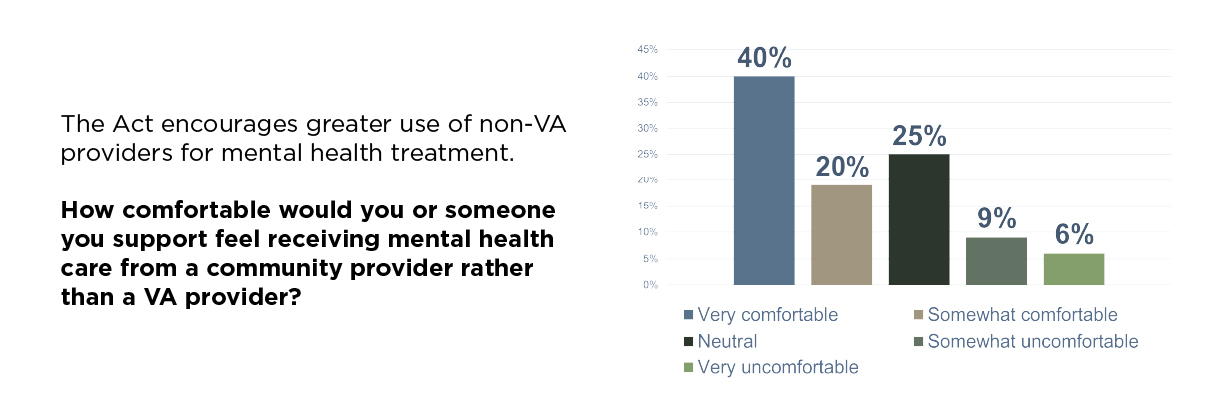Veterans Are Speaking Clearly on the ACCESS Act. Congress Should Listen.

At Mission Roll Call, we aim to amplify the voices of veterans to create positive, lasting change for the veteran community. We do so based on data informed through surveys of the veteran community.
We launched a nationwide survey on the Veterans ACCESS Act of 2025, a bipartisan piece of legislation that aims to improve access to community-based care and mental health services for veterans. Almost 1,300 respondents weighed in and their message to Congress is clear: where VA healthcare is concerned, veterans want more flexibility, more transparency, and more control over their own care.
We conducted this poll in May 2025 as the ACCESS Act of 2025 is gaining traction in both the House and Senate Veterans’ Affairs Committees. Later this Congressional session, policymakers will be debating how far to go in expanding community care options, often a lightning-rod issue in Washington. Some are concerned about the potential impact on the VA’s infrastructure and its ability to deliver care. Others are pushing for a more veteran-centered model that removes red tape and prioritizes individual choice. We wanted to make sure the people most affected by this legislation had a direct way to weigh in.
Our survey reached 1,292 respondents in all 50 states. Eighty-five percent identified as veterans. The rest were family members, active-duty personnel, national guard, reservists, or civilians who care about the veteran community. The results signal a demand for action and a valuable consideration to inform the political debate in Washington.
Veterans overwhelmingly support the core provisions of the ACCESS Act.
Support for the broader expansion of community care is strong. Sixty-seven percent of respondents believe this legislation will improve healthcare outcomes overall. For rural veterans, the support is even more decisive. Seventy-one percent of those living in rural areas said the ACCESS Act would improve timely access to care in their communities. Too often, distance and travel time create real barriers to care for rural veterans. Giving them the option to receive treatment from a qualified local provider isn’t just a matter of convenience, it can be the difference between getting help and going without it.
We also asked about comfort with community providers, particularly for mental health services. A full 60% percent of veterans said they were either very comfortable or comfortable receiving mental health treatment from a non-VA provider. That’s important because mental health care is deeply personal. What works for one veteran might not work for another. Community-based options open the door to a wider range of providers, specialties, and approaches. Veterans want the ability to choose what works best for them.
When asked whether allowing veterans, family members, or caregivers to access mental health or substance use care in the community without a VA referral would improve access, 79 percent said yes. This reflects widespread frustration with delays, bureaucracy, and limited access to specialty care within the VA system. Veterans are telling us they don’t want to be forced to wait weeks or months when care is available just down the road.
Technology and modernization emerged as high priorities in our polling. Seventy-four percent said they would use an online portal to schedule and track care if one were available. That tells us that veterans are looking for a more user-friendly, efficient way to interact with their healthcare system. They’re used to digital tools in every other part of their lives. They expect the VA to meet them where they are most comfortable.
Of course, not all responses reflected full support. Thirty-two percent of respondents expressed concern that expanding community care might reduce staffing or resources at VA hospitals and clinics, with another twenty-four percent being unsure. That concern deserves to be taken seriously. The VA has unique strengths, particularly in specialized areas like prosthetics, polytrauma, and integrated mental health. Our polling suggests that veterans want a strong VA, but they also want choices. Veterans are asking for a system that meets them where they are.
Why This Poll Matters
Too often, decisions in Washington are made based on assumptions about what veterans want. We do our best to replace those assumptions with facts. When Mission Roll Call conducts a poll, we’re creating a direct line between veterans and their elected officials. We’re elevating real voices, not abstract opinions.
That’s especially important in debates like this one, where the stakes are high and the arguments can be emotionally charged. There are valid concerns on both sides. But what often gets lost is the voice of the individual veteran navigating the system, trying to get an appointment, trying to get mental health support, trying to make sense of eligibility rules. Those are the people who should be guiding the conversation. And that’s what our polling allows us to do.
Our approach is rooted in simplicity and clarity. We ask straightforward, non-leading questions. We don’t push a narrative. We ask veterans what they think and then report the results without spin. That gives our advocacy efforts a level of credibility that cuts through the noise. When we walk into a congressional office with more than1,200 responses from across the country, that means something. It’s not just a talking point—it’s a reflection of public will.
How This Shapes Advocacy
We’re already using this data to advocate for the ACCESS Act. We’ve shared our results with members of the House and Senate Veterans’ Affairs Committees. We’ve submitted a Statement for the Record outlining what veterans support and why. We’re working with veteran service organizations, coalition partners, and mental health advocates to make sure this legislation stays focused on what matters most: timely, effective care for those who served.
We’ll continue to keep pressure on. Our advocacy doesn’t end when a bill passes. It extends to how policies are implemented and how they affect veterans on the ground. If a new online portal is promised, we’ll be asking veterans whether it works. If community care networks are expanded, we’ll want to know whether they’re actually accessible and whether veterans are getting the help they need.
This poll was one of our most comprehensive efforts to date, but it won’t be the last. We plan to continue surveying veterans on major legislation, emerging issues, and day-to-day experiences with VA care and more. The more data we collect, the better we can hold the system accountable—and the more effective we can be in Washington.
What Comes Next
Veterans have spoken. They’ve asked for flexibility. They’ve asked for timely access to care. They’ve asked to be treated as informed adults capable of making their own decisions. Congress, the ball is in your court.
To see the full results, click here.






